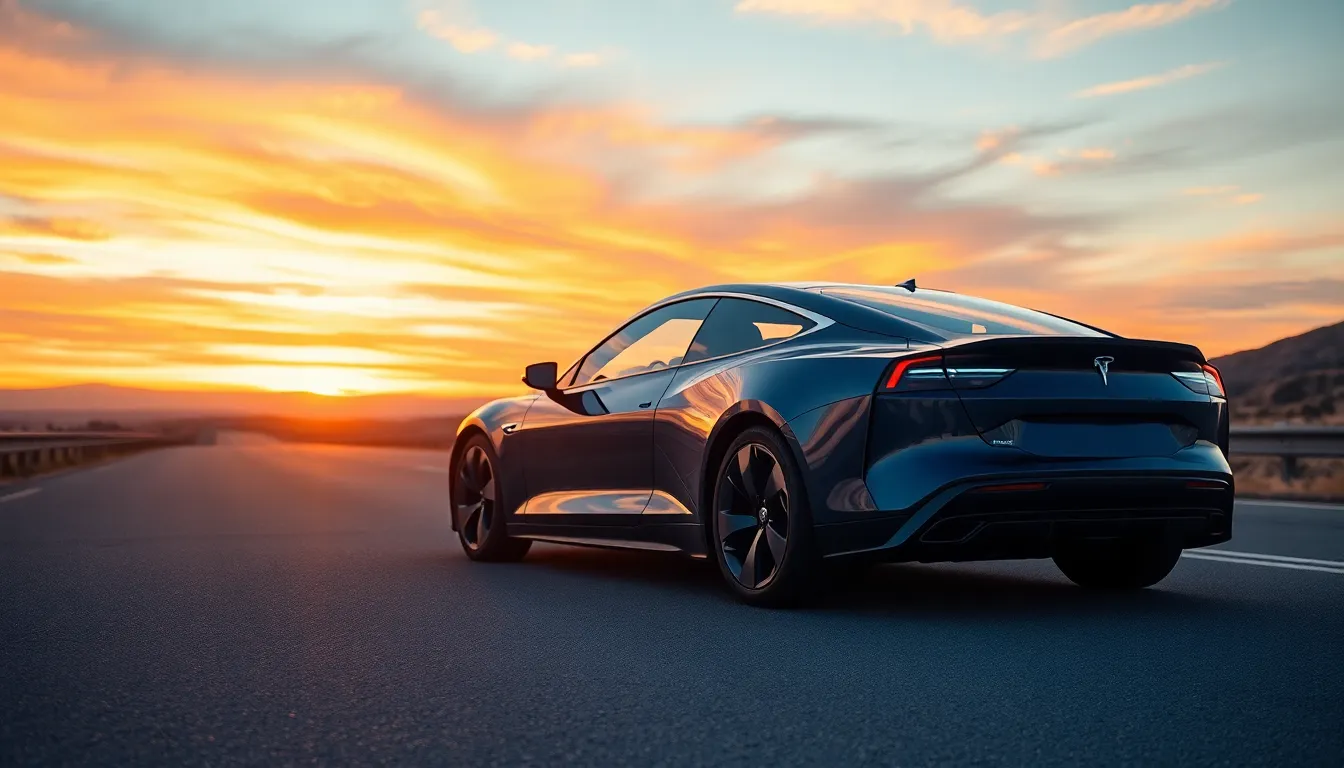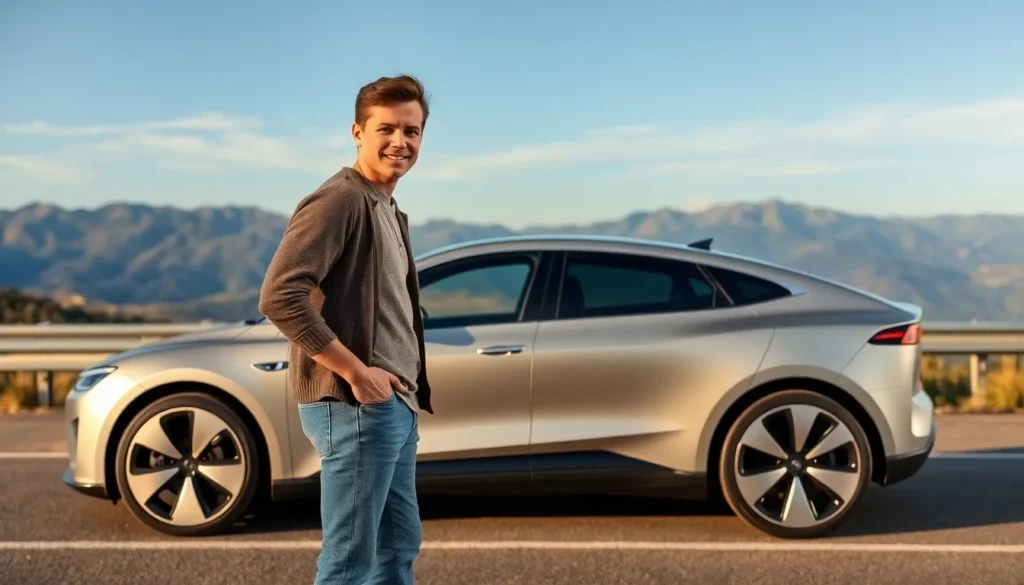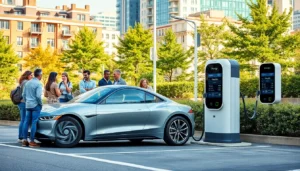Electric cars are no longer just a futuristic dream; they’re here and ready to zoom past gas-guzzlers with a silent roar. As more drivers make the switch, the buzz around electric car performance is growing louder. These eco-friendly marvels are not just about saving the planet; they’re redefining what it means to hit the road with style and speed.
Imagine gliding from 0 to 60 mph faster than you can say “range anxiety.” With instant torque and cutting-edge technology, electric vehicles (EVs) are turning heads and raising eyebrows. So buckle up as we dive into the electrifying world of electric car performance and discover why these sleek machines are the future of driving—without the need for a pit stop at the gas station.
Table of Contents
ToggleOverview Of Electric Car Performance
Electric cars showcase remarkable performance characteristics. Acceleration stands out as a notable feature, with many models achieving 0 to 60 mph in under four seconds. Instant torque delivery enables swift responses, contributing to an exhilarating driving experience.
Efficiency plays a vital role in overall performance metrics. Many electric vehicles operate with a higher efficiency than traditional combustion engines. This efficiency translates into longer ranges, reducing anxiety over battery life during trips.
Battery technology continuously improves, enhancing both performance and longevity. Lithium-ion batteries generally dominate the market, offering energy density and durability. Innovative cooling systems maintain optimal battery temperature, which prolongs lifespan and stabilizes output.
Regenerative braking technology further enhances performance. This system recovers energy during braking, converting it back into usable power. The result provides extended ranges and reduces wear on brakes, contributing to lower maintenance costs.
Handling and ride quality deserve attention as well. Lower center of gravity, due to battery placement, identifies electric cars as stable and responsive. Advanced suspension systems enhance ride comfort, allowing for smooth navigation across various terrains.
In terms of technological innovations, electric cars integrate cutting-edge features. Many models come equipped with advanced driver-assistance systems, promoting safety and convenience. Smart connectivity options often keep drivers informed about vehicle performance and battery status in real time.
Overall, electric cars exhibit a unique blend of speed, efficiency, and high-tech features. Their performance capabilities not only challenge traditional vehicles but also set a new standard in the automotive industry.
Key Performance Metrics

Electric cars showcase several key performance metrics that demonstrate their capabilities and advantages over traditional vehicles.
Acceleration
Electric vehicles excel in acceleration due to instant torque delivery. This feature enables many models to achieve 0 to 60 mph in under four seconds. During a performance test, some models, like the Tesla Model S Plaid, even reach this speed in 1.99 seconds. Drivers experience thrilling responsiveness from electric cars, resulting in an exhilarating driving experience. Various manufacturers focus on enhancing this aspect to appeal to performance enthusiasts. Instant acceleration offers advantages in merging, overtaking, and urban driving.
Top Speed
Top speed stands as another crucial performance metric for electric vehicles. While many electric cars prioritize acceleration, they also reach competitive top speeds. For example, the Rimac C_Two boasts a top speed of 258 mph, showcasing its engineering excellence. Tesla vehicles, such as the Model S, feature a top speed of 200 mph. Manufacturers balance speed with efficiency, ensuring they meet the demands of performance-oriented consumers. Enhanced aerodynamics and advanced engineering contribute to these impressive figures.
Range
Range remains a significant factor for electric vehicle performance. Many modern EVs achieve ranges that meet or exceed 300 miles on a single charge. The Ford Mustang Mach-E offers a range of up to 300 miles, making it suitable for longer trips. Battery technology advancements continue to improve energy density and longevity. This progression helps alleviate range anxiety among drivers. Charging infrastructure and advancements in fast charging technology further enhance the practicality of electric vehicles, ensuring users can rely on their vehicles for daily commuting and extended travel.
Factors Affecting Performance
Several factors significantly influence the performance of electric cars. Understanding these elements helps consumers make informed choices when selecting an EV.
Battery Technology
Battery technology plays a crucial role in electric vehicle performance. Lithium-ion batteries, widely used today, offer high energy density and longevity, directly impacting range and acceleration. Advanced thermal management systems maintain optimal temperature, preventing performance degradation. Continuous research into solid-state batteries promises even greater efficiency, safety, and charging speed. Fast-charging options further enhance convenience, allowing drivers to recharge quickly on long trips. EV models equipped with cutting-edge batteries often achieve impressive acceleration metrics, making them exceptional competitors in the automotive landscape.
Weight and Aerodynamics
Weight and aerodynamics greatly affect an electric car’s efficiency and performance. Manufacturers use lightweight materials, like aluminum and carbon fiber, to reduce overall vehicle weight. This reduction contributes to improved handling and acceleration. Aerodynamic designs minimize drag, allowing electric cars to travel further on a single charge. Slippery shapes and features such as active grille shutters enhance airflow management. Ultimately, optimizing weight and aerodynamics significantly increases range, making electric cars more appealing to environmentally conscious drivers.
Performance Comparisons
Electric cars offer impressive performance metrics when compared to traditional gasoline vehicles. Their instant torque results in faster acceleration, often achieving 0 to 60 mph in under four seconds. Traditional cars, while capable, typically require more time due to engine mechanics and fuel restrictions. Additionally, electric vehicles (EVs) provide real-time power delivery, contributing to smoother acceleration. In terms of top speed, EVs are competitive; models like the Tesla Model S Plaid showcase speeds of 200 mph and beyond. Traditional cars may match these speeds, but EVs often excel in efficiency, making them a more attractive option for performance-oriented drivers.
Electric Cars vs. Traditional Cars
Electric cars demonstrate several key advantages over traditional combustion engine vehicles. Acceleration remains a standout feature for EVs, with many models offering sub-four-second speeds to 60 mph. This quick response translates into superior driving experiences. Furthermore, electric vehicles benefit from lower center of gravity caused by battery layout, enhancing stability during cornering. In contrast, conventional cars often deal with heavier engine components impacting balance. Additionally, regenerative braking in electric cars extends range while reducing wear on brake systems. Traditional vehicles rely solely on mechanical brakes, requiring more frequent maintenance. Overall, the performance landscape favors electric cars, especially in acceleration and handling.
Different Electric Car Models
Several electric car models impress with their unique performance characteristics. The Tesla Model S Plaid stands out, achieving 0 to 60 mph in just 1.99 seconds, showcasing cutting-edge engineering. Another notable model includes the Rimac C_Two, which boasts a top speed of 258 mph, challenging some high-end sports cars. The Ford Mustang Mach-E, however, combines practicality with performance, achieving competitive times while providing ample cargo space. Each model incorporates advanced battery technologies, ensuring efficiency and optimizing range as seen in the Hyundai Kona Electric and Chevrolet Bolt EV, both exceeding 300 miles on a single charge. The diversity in models illustrates the evolving landscape of electric vehicles, appealing to various consumer preferences and performance expectations.
Future Trends In Electric Car Performance
Innovation drives future trends in electric car performance. Manufacturers focus on extending ranges, enhancing acceleration, and improving overall efficiency. Solid-state batteries emerge as a game-changer, offering higher energy density and faster charging capabilities. Mainstream adoption of solid-state technology could transform the landscape of electric vehicles.
Range improvement represents another key trend. Many experts predict that breakthroughs in battery chemistry will lead to electric vehicles achieving over 500 miles on a single charge. Charging infrastructure continues to expand, with ultra-fast chargers drastically reducing downtime for drivers.
Autonomous driving features gain traction within electric models. Enhanced sensors and artificial intelligence software allow for increasingly sophisticated driver-assistance features. Such advancements create opportunities for manufacturers to showcase the performance of their electric cars while prioritizing safety and convenience.
Sustainability remains an integral part of future developments. Electric vehicles use recyclable materials in their components, contributing to the green movement. This focus on eco-friendliness not only appeals to consumers but also positions brands favorably within an evolving market.
Weight reduction techniques and aerodynamic improvements also play a significant role. Engineers explore lightweight materials, such as carbon fiber composites, to enhance handling and efficiency. Various manufacturers experiment with streamlined designs, further boosting speed and performance.
Lastly, connected technology continues advancing within electric vehicles. Integration of smart systems enables real-time monitoring of vehicle performance and energy consumption. As technology progresses, electric cars increasingly offer insights that empower drivers to optimize their driving habits.
Conclusion
Electric cars are reshaping the automotive landscape with their remarkable performance and innovative technology. Their ability to accelerate quickly and offer impressive ranges makes them a compelling choice for modern drivers. As advancements in battery technology continue to evolve, the potential for even greater efficiency and performance becomes more tangible.
The integration of smart features and sustainable materials further enhances the appeal of electric vehicles. With a focus on reducing environmental impact while delivering high performance, electric cars are not just a trend but a significant step toward the future of transportation. As the market expands and technology advances, the driving experience is set to become even more thrilling and eco-friendly.










